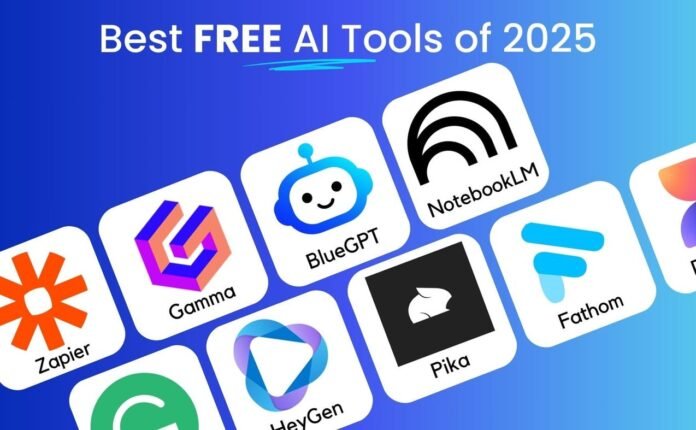Artificial intelligence (AI) has drastically changed the way students learn, study, and juggle their academic schedules. Now that we are heading toward 2025, the number of powerful AI tools available to augment how we study continues to grow, making studying smarter, not harder, a legitimate possibility. Regardless of whether you are a high school, college, or graduate student, these AI tools could help improve your productivity and learning.
1. ChatGPT (OpenAI) AI Study Companion
Use for: tutoring, writing, brainstorming, and debugging code.
ChatGPT has become quite the dynamic academic assistant. Students are not just using ChatGPT to explain challenging content; they are using it to draft essays and debug code. By the time this article is published, there could be ChatGPT integrations in Microsoft Word and Google Docs to make it even more accessible.
Key features in 2025: voice and image inputs, live document collaboration, and contextual memory.
2. Notion AI—The Intelligent Organizer
Use for: notes, project planning, and content creation.
Notion AI functions as a productivity & knowledge management tool of a hybrid nature. Notion can allow students to organize class notes, create summaries, and create a study plan. Notion’s AI can even take unstructured ideas and generate reports or presentations in a structured way.
Key Feature in 2025: Real-time collaboration by providing AI support for group projects.
3. GrammarlyGO – AI-Based Writing Assistant
Use for: grammar checking, adjusting tone and style, clarity
GrammarlyGO summarizes and rewrites passages and gives feedback to match an academic tone. It offers prompts and guidance to help students ideate for essays and assignments. Whether you are writing a research paper or a quick email to a professor, GrammarlyGO gives students a platform to write with confidence.
Key Feature in 2025: Adaptive feedback based on your academic-level field of study.
4. Khanmigo (Khan Academy) – Learning Coach
Use for: math, science, history, test preparation
Khanmigo is the AI tutor by Khan Academy that accomplishes interactive conversation-based learning and processes subject material at the pace of the student. It can explain concepts, quiz you on concepts, and become adaptive based on the student’s strengths and weaknesses.
Key Feature in 2025: Ability to integrate with school curriculums and gamified-based learning modules.
5. Quizlet AI—Smart Flashcards and Quizzing
Use: Memorization, exam prep, custom quizzes
Quizlet provides easy-to-use AI that will create custom flashcards, quizzes, and study games from your notes or a textbook. It will learn how you study best and prioritize the information that you need to study the most.
Key Feature in 2025: Integration with publishers of textbooks and adaptive learning paths.
6. Caktus AI—Academic Content Generator
Use: Essay outlines, code explanations, STEM-related assignments
Caktus AI focuses on generating content for educational purposes across the disciplines. Unlike generic AI, Caktus actively generates subject-specific outputs for topics like engineering, programming, and mathematics, with an academic focus.
Key Feature in 2025: That can create custom citations and STEM-oriented workflows.
7. Perplexity AI – Research Assistant powered by AI
Use: Research, summarizing research papers, investigating a new subject area
Perplexity AI can help students locate reputable sources, summarize complicated papers, and inform themselves on complicated topics with minimal effort. Though it has many uses, it is particularly helpful when doing exploratory research or creating an annotated bibliography.
Key Feature in 2025: Verified sourcing of citations and integration with research portal databases.
8. Tome – AI Presentation Generator
Use: Classroom presentations, visual storytelling
Tome is an AI application that attempts to turn your concepts into presentations with graphical content and minimal effort. With Tome, first you input your topic, and Tome will do the rest by generating slides, graphics, and notes for you.
Key Feature in 2025: Live AI presentation coaching and feedback.
9. Otter.ai—Lecture Transcription and Summarization
Use for: Transcribing classes, automating notes
Otter records and transcribes lecture notes, Zoom calls, or study group discussions. Students can focus on listening to lectures highlighted with clear points while Otter provides accurate notes, summaries, and reminders on key lectures.
Key features in 2025: providing real-time summary suggestions during live lectures.
10. Wolfram Alpha—Computational Knowledge Engine
Use for: Math, science or data analysis
Wolfram Alpha has been a requirement for STEM students. Wolfram Alpha solves equations, analyzes data, and has a detailed explanation for each stage of the equation given and how to compare results. Wolfram Alpha has been able to communicate in natural language with the integration of chat interfaces that offer AI capabilities in 2025.
Key features in 2025: Natural language input that lets students explore problem breakdowns at each stage of the process.
Final thoughts
AI tools that students have at their disposal in the academic space in 2025 are unlike anything we have experienced before to support students’ learning journey, creativity, and productivity. It is very important to preface that these tools should assist in the student’s journey and not replace or support our critical thinking ability and the students’ effort. Being educated, informed, and confident using AI tools can limit the distance between effectively achieving academic success and not. In other words, there is a future of education, and AI tools will support their learning experience, giving them the tools to be along for the journey of their educational experience as their digital co-pilots.



